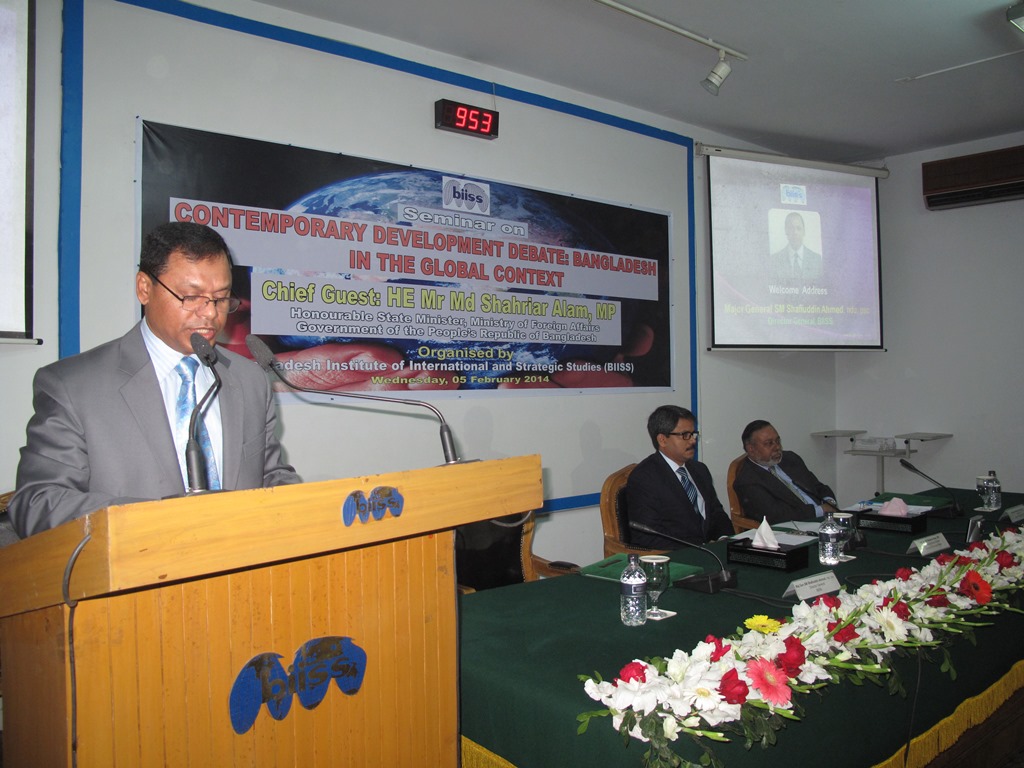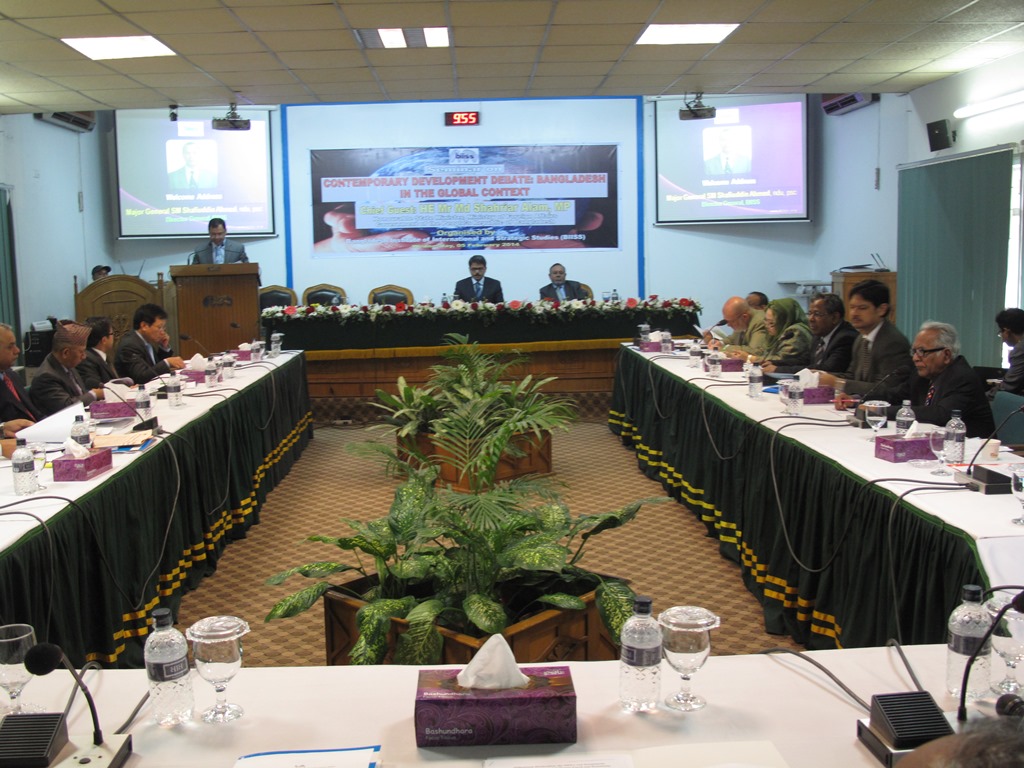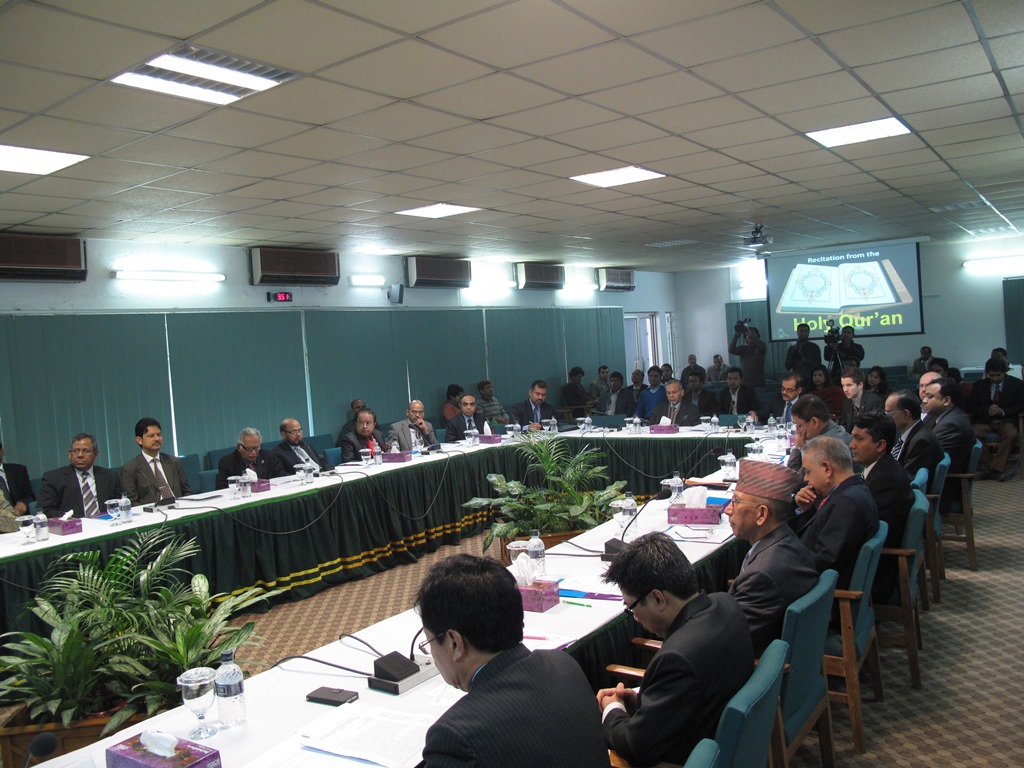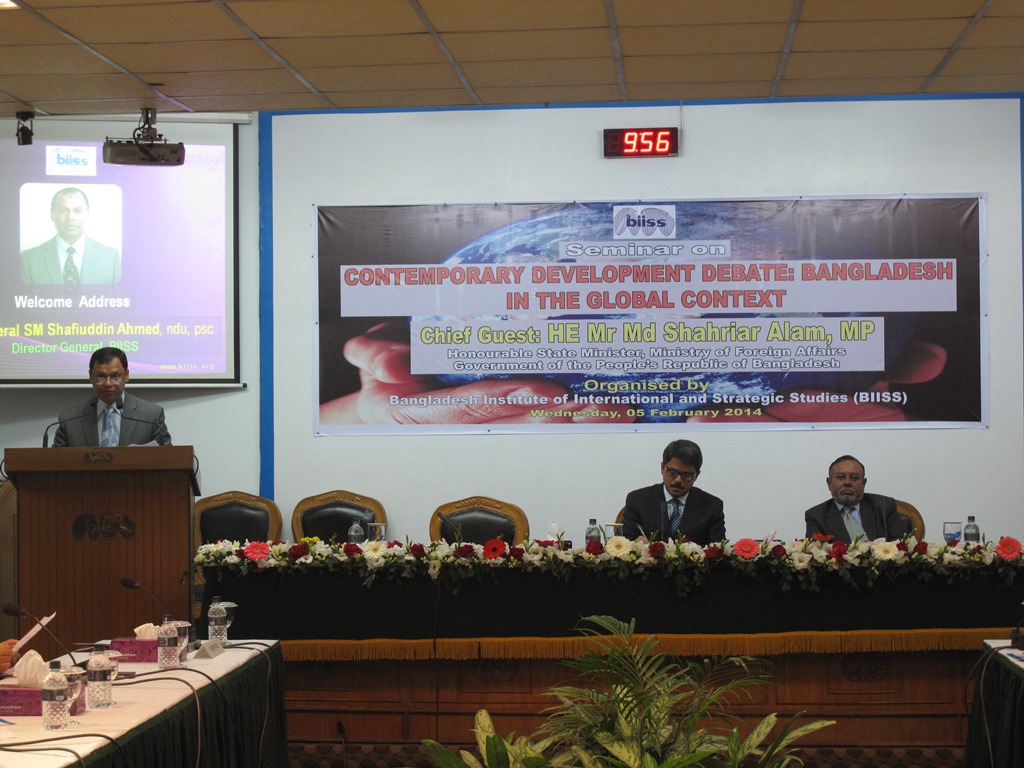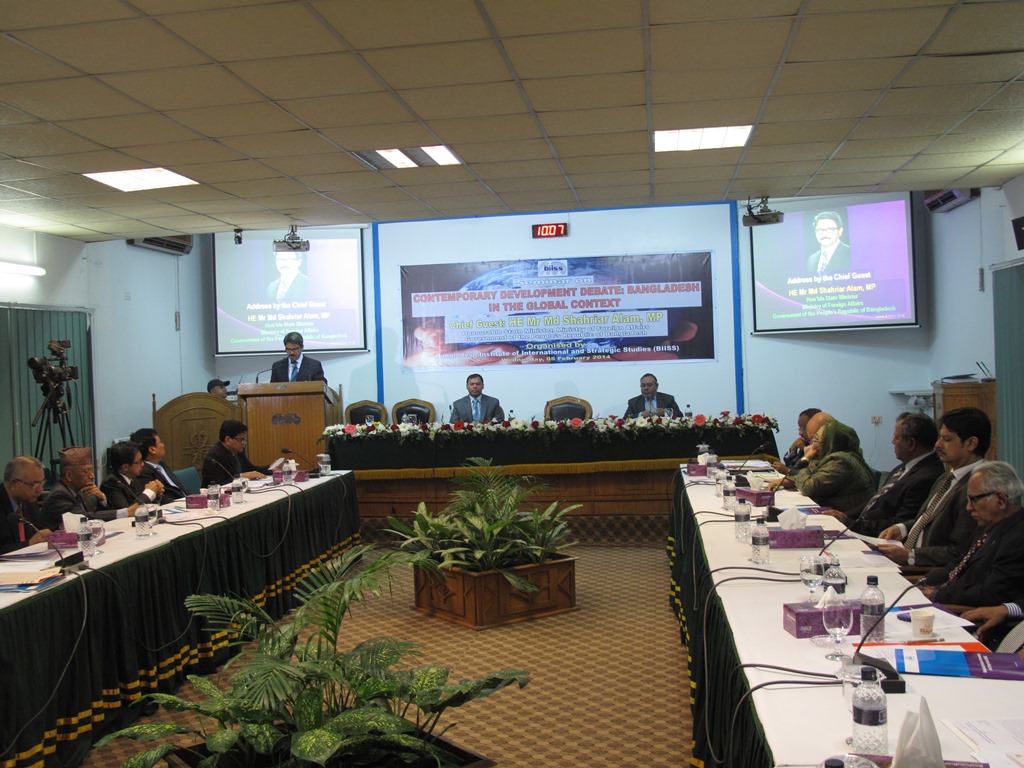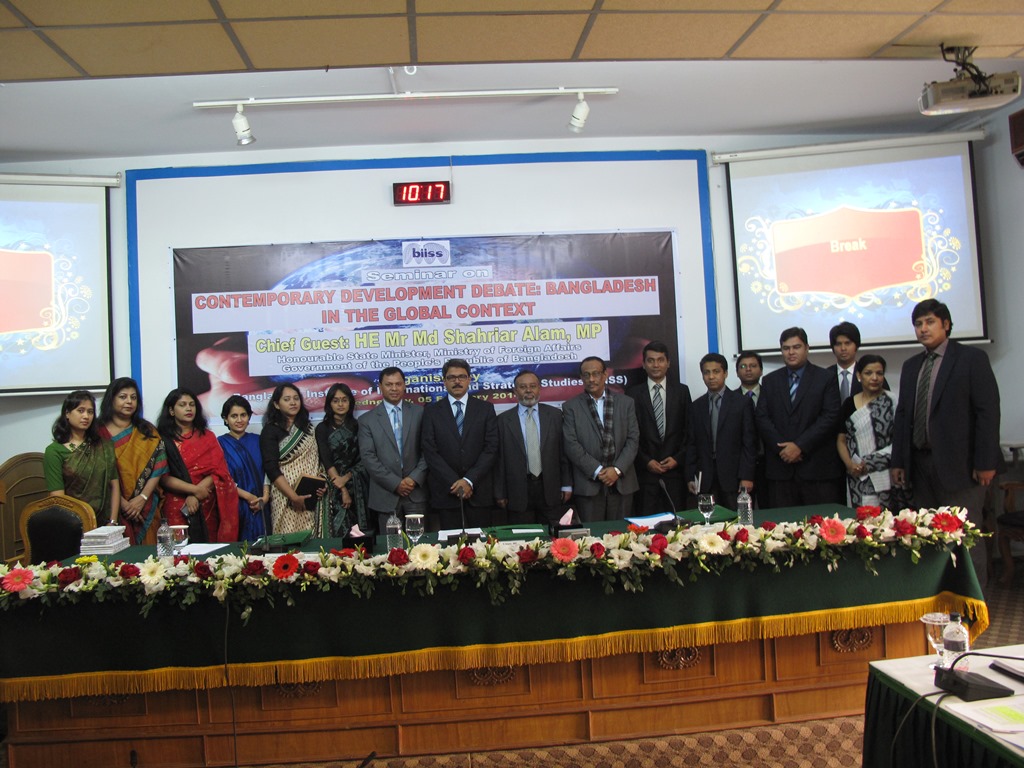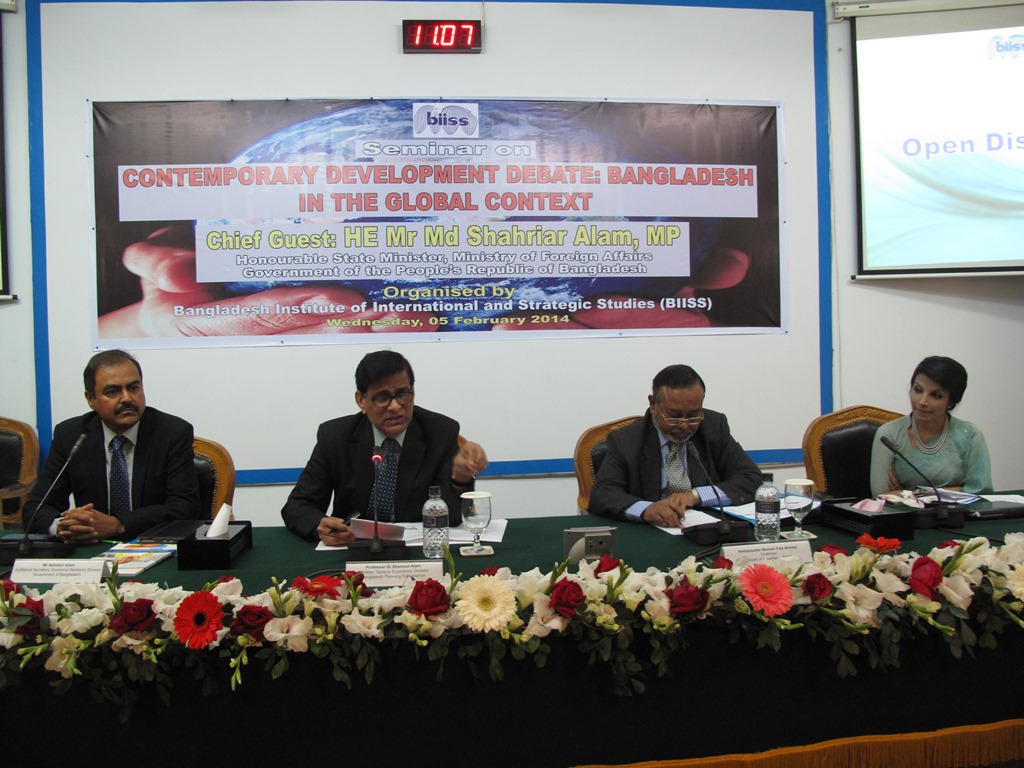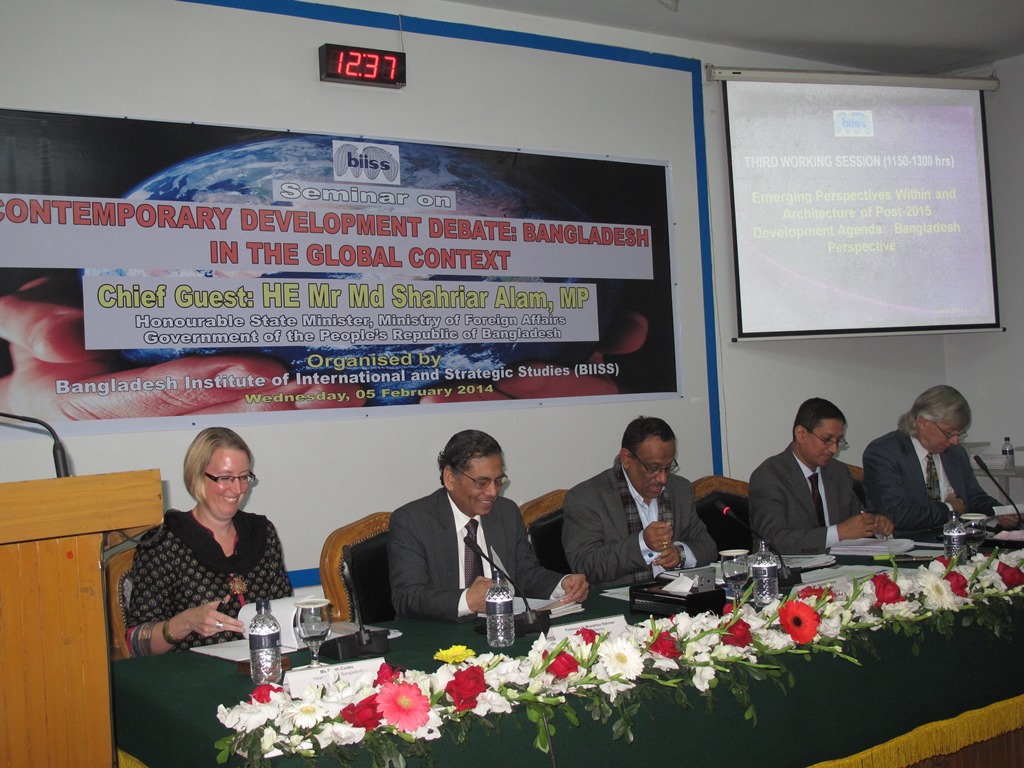Seminar on Contemporary Development Debate: Bangladesh in the Global Context on on 05 February 2014
DATE: 2014-02-05
Bangladesh Institute of International and Strategic Studies (BIISS) organised a Seminar on Contemporary Development Debate: Bangladesh in the Global Context on 05 February 2014 at BIISS auditorium, Dhaka. Mr Md Shahriar Alam, MP, Honourable State Minister, Ministry of Foreign Affairs, Government of the People's Republic of Bangladesh was present at the inaugural session of the seminar as the Chief Guest. Major General SM Shafiuddin Ahmed, ndu, psc, Director General of BIISS delivered the Address of Welcome. Ambassador Munshi Faiz Ahmad, Chairman, Board of Governors, BIISS concluded the inaugural session.
In his Welcome Address, Major General SM Shafiuddin Ahmed, ndu, psc, Director General, BIISS, noted that economic and social indicators described in the Vision 2021 of the government are closely associated with the targets of the Millennium Development Goals (MDGs). The MDG frameworks have helped the member countries galvanise development initiatives and guide global and national development priorities. He added that further efforts and a strong global partnership are needed to accelerate the pace of current development targets and formulate a new set of goals for the post-2015 era. The Rio+20 outcome document is very much significant from Bangladesh perspective too. And we have to work hard in order to endorse a concrete policy to achieve the sustainable development goals as well as the current MDGs. Simultaneously, we need to make sure that our development aspirations are fulfilled and climate change issues are also addressed properly in the emerging perspectives within and the architecture of post-2015 development agenda, he said.
Mr Md Shahriar Alam, MP, in his address as the Chief Guest, said that we are around 700 days away from completion timeline of the MDGs. While Bangladesh has fared well in terms of most of the MDG targets and indicators, the global scenario vis--vis many MDG targets may not give us enough to cheer about. Some of the populous and climatically vulnerable regions lag behind on a number of targets, he added. He further said that by now, it is widely recognised that resources for attainment of the MDGs was inadequate in the developing world. Mid way through last decade, as the world faced challenging and often uncertain period, especially in the wake of Triple F (Food-Fuel-Finance) crisis, we saw how the efforts of much of the developing world got constrained. Much of their precious development gains got wiped out. Hence, within the emerging development architecture, the new set of Goals and corresponding Targets must have clear and robust support mechanism. And, also an enabling environment, globally. He noted that countries like Bangladesh want the Goals should be framed based on values and principles like equity, inclusion, common but differentiated responsibility, respective capacities, etc. Before the global process began, Bangladesh undertook broader, national consultations and developed her own perspective on Post-2015. By the middle of last year, we did submit a set of indicative goals, targets and indicators as well to the UN. Given the spread of the exercise and the intricacies, Bangladesh is deeply engaged within traditional group formations - like LDCs, G77 as also within groups of countries with specific interest. Both the evolving substance and the process appears crucial. The areas that are of particular interest to us include, for instance, population dynamics, water. Our approach is determined taking into account a balanced view of our broader national orientation, interests, long-term growth and development perspectives and evolving regional dimensions, he added.
Munshi Faiz Ahmad, Chairman, Board of Governors, BIISS, noted that Bangladesh has achieved commendable success in efforts to pursue the Millennium Development Goals. Targeted policies and proactive programmes of the government, supplemented by private sector and NGO efforts, generated enthusiastic and effective participation of the target groups, resulting in this success. Inspite of severe limitations, the country is also making serious efforts at achieving environmental sustainability through addressing mitigation and adaptation issues. We are making our best efforts to enhance cooperation with our development partners in all these areas, he added. Issues such as increasing inequality and a changing poverty landscape, human mobility and migration, insecurity and social exclusion, climate change, degradation of the environment and consequent challenges to sustainability of development require a comprehensive approach to the post-2015 framework, he added. For that approach to be successful, it must take into account efficient integration of all aspects of population dynamics into policy, operation and implementation.
The seminar was divided into three Working Sessions. The Working Session I titled Millennium Declaration, the MDGs and Bangladesh: Achievements Made, Challenges Faced and Remaining Tasks was moderated by Ambassador Munshi Faiz Ahmad, Chairman, Board of Governors of BIISS. Professor Dr Shamsul Alam, Member, General Economics Division of Bangladesh Planning Commission made a presentation, while Mr Ashadul Islam, Additional Secretary, Economic Relations Division and Ms Saida Muna Tasneem, Director General (UN), Ministry of Foreign Affairs spoke as designated discussants in the session. The Working Session II titled Rio+20 Outcome and Other Global Processes Related to Sustainable Development: Bangladesh Perspective was moderated by Mr Mesbah ul Alam, Secretary, Ministry of Disaster Management and Relief, Government of Bangladesh. A presentation was given by Dr Qazi Kholiquzzaman Ahmad, Chairman, Palli Karma-Sahayak Foundation in this session. The designated discussants in the Session II included Professor Dr Ainun Nishat, Vice-Chancellor of BRAC University and Dr Mahfuz Kabir, Senior Research Fellow of BIISS. The Working Session III titled Emerging Perspectives Within and Architecture of Post-2015 Development Agenda: Bangladesh Perspective was moderated by Mr Shahidul Haque, Foreign Secretary, Government of Bangladesh. Mr Neal Walker, United Nations Resident Coordinator in Bangladesh, Ms Sarah Cooke, DFID Country Representative to Bangladesh, Mr M Riaz Hamidullah, Director General (Economic Affairs), Ministry of Foreign Affairs and Professor Dr Mustafizur Rahman, Executive Director, Centre for Policy Dialogue spoke as designated discussants.
Scholars, members of academia, policy makers, former and current government officials, members of diplomatic corps as well as representatives from development partner organisations participated in the open discussion session. Different speakers on the seminar highlighted various aspects related to the post-MDG agenda and sustainability issues.

